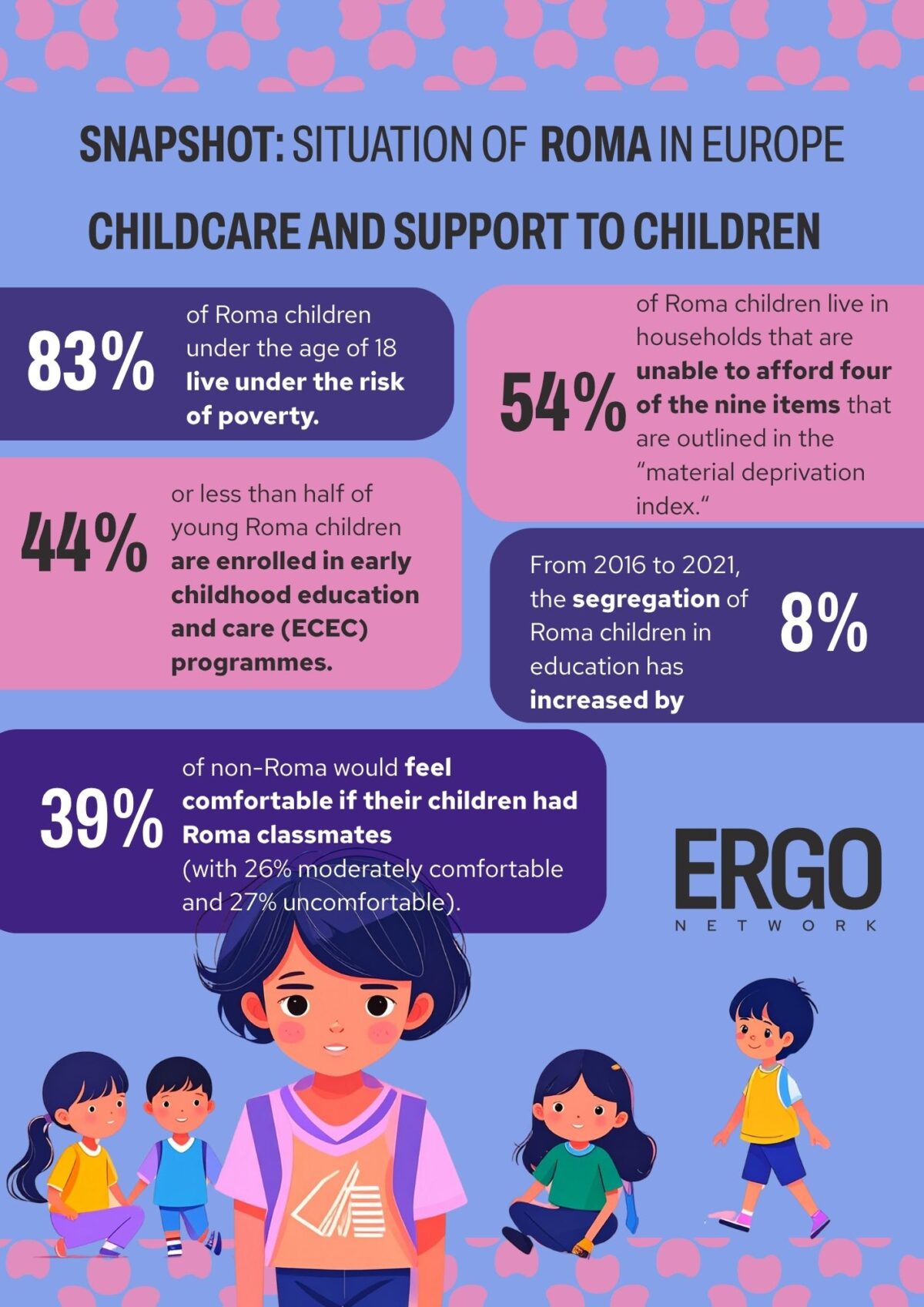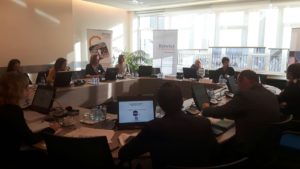Input to the European Commission consultation on the Roadmap for a Council Recommendation for a Child Guarantee
The European Commission will be proposing a Child Guarantee in 2021, an instrument specifically designed to tackle the situation of children in need.
The Child Guarantee is meant to ensure that all children in Europe who are at risk of poverty, social exclusion, or are otherwise disadvantaged, have access to essential services of good quality.
It will recommend that EU countries invest in and develop strategies and action plans to ensure that children in need have access to free or affordable services such as education, healthcare, nutrition & housing, culture and leisure activities.
ERGO Network strongly welcomes the initiative for an EU Child Guarantee and has given input into the Roadmap leading towards it (Download the full input). With Roma children especially hard hit by poverty, we appreciate the attention paid to this important topic.
The first years of a child’s life are the most important in their personal development, and yet Roma children have been left behind for centuries in what concerns a good start in life. While the Roadmap towards the Child Guarantee identifies several groups of “children in need”, Roma children are not one of them. This is unacceptable, where the Fundamental Rights Agency found that every third Roma child (30%) lives in households where someone went to bed hungry at least once in the previous month, and only about half (53%) of young Roma children are enrolled in early childhood education and care programmes. Unless they are explicitly mentioned as target group and specific measures put in place to deal with very specific needs, experience shows that Roma children will once again be left behind.
The Roadmap features an almost exclusive focus on services, where nothing is said about access to income. There are no poor children in rich families, and wrap-around support for parents must be part of the solution, including income support and pathway approaches towards sustainable, quality jobs. Currently, only 43% of Roma aged 20-64% are in paid work, and over 80% of Europe’s Roma are at risk of poverty and social exclusion, according to FRA. Poverty has a considerable impact on the children’s physical, mental, and emotional development, and increases the chances of lagging behind in all the aspects of their adult life.
The vicious circles of poverty, spatial segregation, and discrimination act as powerful barriers, preventing Roma children from accessing education on equal footing with their non-Roma peers. While education, including early childhood education and care, is touted to be free in many countries, it is de facto not, and many poor Roma families can’t cope with the associated costs of clothing, nappies, transport, hygiene etc. Lack of majority languages skills, limited access to early childhood education and care, and a state of poverty which does not allow for proper studying at home mean that Roma children end up segregated and bullied by colleagues, their parents, and staff alike, and even sometimes placed in schooling for children with learning disabilities. During the Covid-19 pandemic and associated protection and prevention measures, many Roma children found themselves unable to access online education, due to absent infrastructure and equipment (the digital divide).
In what concerns housing, many Roma neighbourhoods are segregated or isolated, with no childcare or healthcare facilities nearby. Adequate housing is an urgent priority for Roma communities, as one in three Roma (32%) live in households with a leaking roof, damp walls, or rot, one in five Roma (20%) live in dwellings that are too dark, and 78% of Roma live in overcrowded households. These disastrous living conditions have a tremendously damaging impact on the health and wellbeing of Roma children, who experience significant health inequalities. The life expectancy of Roma across Europe is 10 to 15 years lower than of the majority population. In many countries, the public health infrastructure does not cover Roma communities, with the nearest clinic (not to mention hospital) often located far away. Additional complicating factors include the lack of identity papers, the lack a legal address, the lack of access to a bank account, the lack of information about registration processes and available services, as well as language barriers. Investing in children must mean, first and foremost, guaranteeing good health and wellbeing for all, particularly those suffering the most disadvantages, such as Roma children.
In order to ensure that Roma children develop and thrive while enjoying the same opportunities as their non-Roma peers, it is fundamental to tackle antigypsyism in all its forms, as well as intersectional discrimination. 41% of Roma feel they have been discriminated against in everyday situations such as looking for work, at work, or when trying to access housing, health, and education – and this is the environment that Roma children grow up in. This should be a de facto horizontal priority in the fields of education, employment, health, housing, and poverty reduction. Preventive and proactive measures are needed to alter public perceptions, prevalent misrepresentations, and misinformation about Roma, and to develop positive counter-narratives. The Child Guarantee should strive to ensure the teaching of Romani language and history in schools, including about the Holocaust and slavery of Roma across Member States, as well as for the necessary dedicated special pedagogical support, including trained Roma education mediators in communities.
The Covid-19 situation highlights the urgent need to invest in proper care services and income support to children and their families. In order to provide equal opportunities for every Roma child, we must guarantee that Roma children and families are not left behind in the Child Guarantee. Appropriate links must be made to the objectives of the EU Strategic Framework for Roma Equality and Inclusion, and interplay ensured between the implementation of the Child Guarantee multi-annual national strategies and the National Roma Integration Strategies. The EU Cohesion Policy and recovery funds will also have a key role to play.
The Child Guarantee will only be effective if it achieves wide ownership by beneficiaries, if it is rooted in direct evidence from the ground about what works and what is needed, and if its delivery and monitoring are underpinned by a comprehensive and meaningful partnership of all stakeholders, including civil society organisations. Tailored outreach measures need to be put in place to ensure the participation of Roma children and that of their parents, including through the civil society organisations representing them. Clear dialogue and cooperation protocols need to be put in place, to ensure that the voice of marginalised and racialised children is heard and taken into account, while necessary financial resources need to be made available to support Roma NGOs and build awareness, participation, and active citizenship, as well as more resilient democracies.





